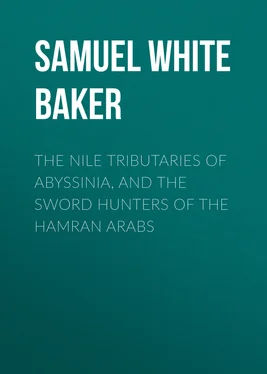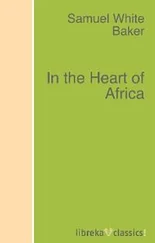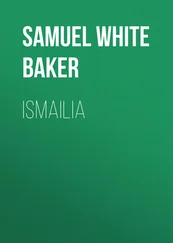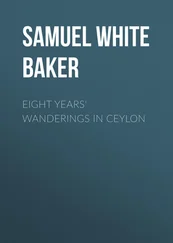Samuel White Baker - The Nile Tributaries of Abyssinia, and the Sword Hunters of the Hamran Arabs
Здесь есть возможность читать онлайн «Samuel White Baker - The Nile Tributaries of Abyssinia, and the Sword Hunters of the Hamran Arabs» — ознакомительный отрывок электронной книги совершенно бесплатно, а после прочтения отрывка купить полную версию. В некоторых случаях можно слушать аудио, скачать через торрент в формате fb2 и присутствует краткое содержание. Жанр: Путешествия и география, История, foreign_edu, foreign_antique, foreign_prose, на английском языке. Описание произведения, (предисловие) а так же отзывы посетителей доступны на портале библиотеки ЛибКат.
- Название:The Nile Tributaries of Abyssinia, and the Sword Hunters of the Hamran Arabs
- Автор:
- Жанр:
- Год:неизвестен
- ISBN:нет данных
- Рейтинг книги:3 / 5. Голосов: 1
-
Избранное:Добавить в избранное
- Отзывы:
-
Ваша оценка:
- 60
- 1
- 2
- 3
- 4
- 5
The Nile Tributaries of Abyssinia, and the Sword Hunters of the Hamran Arabs: краткое содержание, описание и аннотация
Предлагаем к чтению аннотацию, описание, краткое содержание или предисловие (зависит от того, что написал сам автор книги «The Nile Tributaries of Abyssinia, and the Sword Hunters of the Hamran Arabs»). Если вы не нашли необходимую информацию о книге — напишите в комментариях, мы постараемся отыскать её.
The Nile Tributaries of Abyssinia, and the Sword Hunters of the Hamran Arabs — читать онлайн ознакомительный отрывок
Ниже представлен текст книги, разбитый по страницам. Система сохранения места последней прочитанной страницы, позволяет с удобством читать онлайн бесплатно книгу «The Nile Tributaries of Abyssinia, and the Sword Hunters of the Hamran Arabs», без необходимости каждый раз заново искать на чём Вы остановились. Поставьте закладку, и сможете в любой момент перейти на страницу, на которой закончили чтение.
Интервал:
Закладка:
The animals of the desert—gazelles, hyaenas, and wild asses—are compelled to resort to these crowded drinking-places, occupied by the flocks of the Arabs equally with the timid beasts of the chase. The birds that during the cooler months would wander free throughout the country, are now collected in vast numbers along the margin of the exhausted river; innumerable doves, varying in species, throng the trees and seek the shade of the dome palms; thousands of desert grouse arrive morning and evening to drink and to depart; while birds in multitudes, of lovely plumage, escape from the burning desert, and colonize the poor but welcome bushes that fringe the Atbara river.
The heat was intense. As we travelled along the margin of the Atbara, and felt with the suffering animals the exhaustion of the clinmate, I acknowledged the grandeur of the Nile that could overcome the absorption of such thirsty sands, and the evaporation caused by the burning atmosphere of Nubia. For nearly 1,200 miles from the junction of the Atbara with the parent stream to the Mediterranean, not one streamlet joined the mysterious river, neither one drop of rain ruffled its waters, unless a rare thunder-shower, as a curious phenomenon, startled the Arabs as they travelled along the desert. Nevertheless the Nile overcame its enemies, while the Atbara shrank to a skeleton, bare and exhausted, reduced to a few pools that lay like blotches along the broad surface of glowing sand.
Notwithstanding the overpowering sun, there were certain advantages to the traveller at this season; it was unnecessary to carry a large supply of water, as it could be obtained at intervals of a few miles. There was an indescribable delight in the cool night, when, in the perfect certainty of fine weather, we could rest in the open air with the clear bright starlit sky above us. There were no mosquitoes, neither were there any of the insect plagues of the tropics; the air was too dry for the gnat tribe, and the moment of sunset was the signal for perfect enjoyment, free from the usual drawbacks of African travel. As the river pools were the only drinking-places for birds and game, the gun supplied not only my own party, but I had much to give away to the Arabs in exchange for goat's milk, the meal of the dome nuts, &c. Gazelles were exceedingly numerous, but shy, and so difficult to approach that they required most careful stalking. At this season of intense heat they drank twice a day—at about an hour after sunrise, and half an hour before sunset.
The great comfort of travelling along the bank of the river in a desert country is the perfect freedom, as a continual supply of water enables the explorer to rest at his leisure in any attractive spot where game is plentiful, or where the natural features of the country invite investigation. We accordingly halted, after some days' journey, at a spot named Collodabad, where an angle of the river had left a deep pool of about a mile in length: this was the largest sheet of water that we had seen throughout the course of the Atbara. A number of Arabs had congregated at this spot with their flocks and herds; the total absence of verdure had reduced the animals to extreme leanness, as the goats gathered their scanty sustenance from the seed-pods of the mimosas, which were shaken down to the expectant flocks by the Arab boys, with long hooked poles. These seeds were extremely oily, and resembled linseed, but the rank flavour was disagreeable and acrid.
This spot was seven days' march from the Nile junction, or about 160 miles. The journey had been extremely monotonous, as there had been no change in the scenery; it was the interminable desert, with the solitary streak of vegetation in the belt of mimosas and dome palms, about a mile and a half in width, that marked the course of the river. I had daily shot gazelles, geese, pigeons, desert grouse, &c. but no larger game. I was informed that at this spot, Collodabad, I should be introduced for the first time to the hippopotamus.
Owing to the total absence of nourishing food, the cattle produced a scanty supply of milk; thus the Arabs, who depended chiefly upon their flocks for their subsistence, were in great distress, and men and beasts mutually suffered extreme hardship. The Arabs that occupy the desert north of the Atbara are the Bishareens; it was among a large concourse of these people that we pitched our tents on the banks of the river at Collodabad.
This being the principal watering-place along the deserted bed of the Atbara, the neighbourhood literally swarmed with doves, sand grouse, and other birds, in addition to many geese and pelicans.
Early in the morning I procured an Arab guide to search for the reported hippopotami. My tents were among a grove of dome palms on the margin of the river; thus I had a clear view of the bed for a distance of about half a mile on either side. This portion of the Atbara was about 500 yards in width, the banks were about thirty feet perpendicular depth; and the bend of the river had caused the formation of the deep hollow on the opposite side which now formed the pool, while every other part was dry. This pool occupied about one-third the breadth of the river, bounded by the sand upon one side, and by a perpendicular cliff upon the other, upon which grew a fringe of green bushes similar to willows. These were the only succulent leaves that I had seen since I left Berber.
We descended the steep sandy bank in a spot that the Arabs had broken down to reach the water, and after trudging across about 400 yards of deep sand, we reached the extreme and narrowest end of the pool; here for the first time I saw the peculiar four-toed print of the hippopotamus's foot. A bed of melons had been planted here by the Arabs in the moist sand near the water, but the fruit had been entirely robbed by the hippopotami. A melon is exactly adapted for the mouth of this animal, as he could crunch the largest at one squeeze, and revel in the juice. Not contented with the simple fruits of the garden, a large bull hippopotamus had recently killed the proprietor. The Arab wished to drive it from his plantation, but was immediately attacked by the hippo, who caught him in its mouth and killed him by one crunch. This little incident had rendered the hippo exceedingly daring, and it had upon several occasions charged out of the water, when the people had driven their goats to drink; therefore it would be the more satisfactory to obtain a shot, and to supply the hungry Arabs with meat at the expense of their enemy.
At this early hour, 6 A.M., no one had descended to the pool, thus all the tracks upon the margin were fresh and undisturbed: there were the huge marks of crocodiles that had recently returned to the water, while many of great size were still lying upon the sand in the distance: these slowly crept into the pool as we approached. The Arabs had dug small holes in the sand within a few yards of the water: these were the artificial drinking-places for their goats and sheep, that would have been snapped up by the crocodiles had they ventured to drink in the pool of crowded monsters. I walked for about a mile and a half along the sand without seeing a sign of hippopotami, except their numerous tracks upon the margin. There was no wind, and the surface of the water was unruffled; thus I could see every creature that rose in the pool either to breathe or to bask in the morning sunshine. The number and size of the fish, turtles, and crocodiles were extraordinary; many beautiful gazelles approached from all sides for their morning draught: wild geese, generally in pairs, disturbed the wary crocodiles by their cry of alarm as we drew near, and the desert grouse in flocks of many thousands had gathered together, and were circling in a rapid flight above the water, wishing, but afraid, to descend and drink. Having a shot gun with me, I fired and killed six at one discharge, but one of the wounded birds having fallen into the water at a distance of about 120 yards, it was immediately seized by a white-throated fish-eagle, which perched upon a tree, swooped down upon the bird, utterly disregarding the report of the gun. The Bishareen Arabs have no fire-arms, thus the sound of a gun was unknown to the game of the desert.
Читать дальшеИнтервал:
Закладка:
Похожие книги на «The Nile Tributaries of Abyssinia, and the Sword Hunters of the Hamran Arabs»
Представляем Вашему вниманию похожие книги на «The Nile Tributaries of Abyssinia, and the Sword Hunters of the Hamran Arabs» списком для выбора. Мы отобрали схожую по названию и смыслу литературу в надежде предоставить читателям больше вариантов отыскать новые, интересные, ещё непрочитанные произведения.
Обсуждение, отзывы о книге «The Nile Tributaries of Abyssinia, and the Sword Hunters of the Hamran Arabs» и просто собственные мнения читателей. Оставьте ваши комментарии, напишите, что Вы думаете о произведении, его смысле или главных героях. Укажите что конкретно понравилось, а что нет, и почему Вы так считаете.












